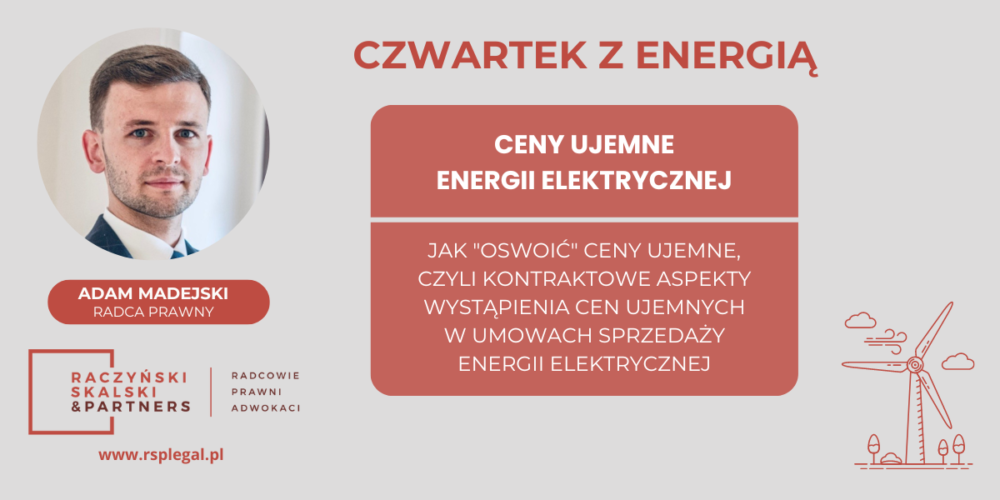The phenomenon of negative prices has gained momentum, particularly on foreign exchanges. In Poland, negative prices first appeared in June last year. Since previously the chances of such a situation were theoretical, there was reluctance to pay attention to it in the construction of contractual clauses. In the current situation, however, the risk of negative prices belongs to the “must-have” catalog of any contract for the sale of electricity, in which the method of determining the price depends on the quotations of the Polish Power Exchange.
1. Negative prices in a nutshell
Negative pricing is a phenomenon that occurs on the power exchange operated by the Polish Power Exchange. Depending on the circumstances, negative prices can appear on both the Day-Ahead Market and the Balancing Market. They occur when a significant oversupply of electricity persists, causing prices to fall in the following hours. The increasing amount of electricity supplied by RES installations means that we will be dealing with the issue of negative prices with increasing frequency, as well as with non-market curtailment of renewable sources.
2. Negative prices – a contractual approach
The phenomenon of negative prices deserves special attention in cases of contracts:
1. vPPAs, i.e. financial settlement of electricity price differences between the generator and the consumer,
2. classic PPAs, i.e. contracts for the supply (sale) of electricity to the end user, as long as the settlement formula is based on the current quotations n the Commodity Exchange, most often on the Day-Ahead Market.
The first solution is to treat negative prices as a case of force majeure. While it is difficult to say now that it is an unpredictable phenomenon, it is certainly independent of the will and efforts of the parties. For vPPAs, it can be considered that for the duration of negative prices, the parties do not settle. For contracts with physical delivery, such a provision would be unworkable in practice, because even if the installations are temporarily turned off, the customer will not, as a rule, stop consuming electricity, which will have to be balanced for reasons attributable to the seller. Thus, the emergence of negative prices will be the seller’s risk. This risk can be excluded by assuming that negative prices constitute a case of force majeure, although this solution should be considered unfavorable to the customer and debatable on the market level.
Another solution in the event of negative prices is to grant the generator the right to shut down the installation at its own discretion. However, this will mean that during the hours in question, the generator will not only not generate electricity for settlement (for vPPAs) or delivery (classic PPAs), but also will not be entitled to obtain and transfer guarantees of origin, which are very often an additional element of RES power sales contracts. It would seem that a fair solution would be to recognize that a generator can curtail or shut down RES installations for the duration of negative prices, but this does not reduce its obligations to deliver or settle a certain volume of electricity and guarantees of origin. Otherwise, the customer’s position would be doubly disadvantaged – not only could it not count on the performance of its contractual obligations, but also, in general, it could settle or use a smaller volume than it assumed when entering into the contract.
The solution applied to electricity prosumers who will benefit from hourly billing of energy generated in a microinstallation is to assume that in a given hour of negative price, the energy billing price is zero. This is a solution that protects prosumers from market fluctuations and is intended to prevent discouragement of micro-installation use. Also for PPAs, it is possible to assume that the settlement of electricity during negative prices will take place at the so-called zero price, so that the generator does not have to choose each time between the fulfillment of contractual obligations and the profitability of energy production during negative prices.
Regardless of the chosen formula, it is particularly important that both parties are aware of the consequences of contract prices and the risk of their increasingly frequent appearance on POLPX quotations. Proper regulation of this issue in the contract should prevent misunderstandings and economic imbalance between the parties.



